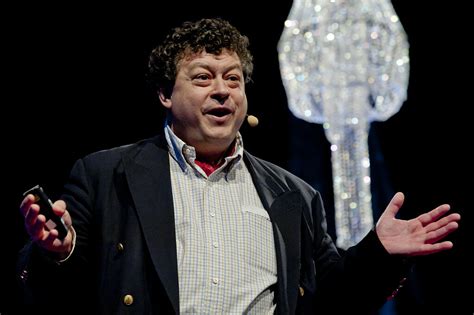A Quote by Jean-Philippe Courtois
We want to make Bing more than just search: to be the key intelligence engine behind the phone, get people to navigate, and present information in a meaningful way.
Related Quotes
All sorts of factors contribute to what Facebook or Twitter present in a feed, or what Google or Bing show us in search results. Our expectation is that those intermediaries will provide open conduits to others' content and that the variables in their processes just help yield the information we find most relevant.
In spite of my own reservations about Bing's ability to convert Google users, I have to admit that the search engine does offer a genuine alternative to Google-style browsing, a more coherently organized selection of links, and a more advertiser-friendly environment through which to sell space and links.
An enlightened person or business is not concerned primarily with making money, because when you are concerned with making money you want the future more than the present. Whenever you want the future more than you want the present, true intelligence cannot flow into what you do, because it can do so only when you are totally aligned with the present moment.
This intelligence, or what I'll call "the wisdom of crowds," is at work in the world in many different guises. It's the reason the Internet search engine Google can scan a billion Web pages and find the one page that has the exact piece of information you were looking for. It's the reason it's so hard to make money betting on NFL games, and it helps explain why, for the past fifteen years, a few hundred amateur traders in the middle of Iowa have done a better job of predicting election results than Gallup polls have.
You're able to use a search engine, like Google or Bing or whatever. But those engines don't understand anything about pages that they give you; they essentially index the pages based on the words that you're searching, and then they intersect that with the words in your query, and they use some tricks to figure out which pages are more important than others. But they don't understand anything.
Everyone and his Big Brother wants to log your browsing habits, the better to build a profile of who you are and how you live your life - online and off. Search engine companies offer a benefit in return: more relevant search results. The more they know about you, the better they can tailor information to your needs.
Once you've created an intelligence so smart, the real job of that intelligence is to protect itself from other intelligences becoming more intelligent than it. It's just kind of like human beings. The way you look at money or the way you look at the success of your child, you always want to make sure that as far as it gets, it can protect itself and continue forward. So I think any type of intelligence, no matter what it is, is going to have this very basic principle to protect the power that it has gained.



































